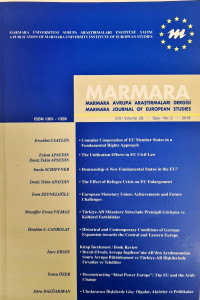Abstract
In 1992 the Maastricht Treaty introduced the concept of 'Citizenship of the Union'. By granting EU citizenship the European Union created a common identity for Member State nationals, but the European citizenship granted Union citizenship rights only for EU nationals. For non-nationals, who arrived from third countries (non-EU states) and stayed in one of the EU Member States the regulation about the Union citizenship did not provide Union rights. This paper seeks to interpret the status of third country nationals in comparison to the EU citizens, especially the position of third-country nationals who are long-term residents. This paper argues that as a consequence of litigation by individuals before EU courts and the provisions of the Charter of the Fundamental Rights, TCNs already enjoy a number of European citizenshiprelated and citizenship-like freedoms, rights, benefits and general principles, which are subject to protection at the EU level. The conclusion of the article is that granting TCNs citizenship-related rights and their analogous interpretation with the rights enjoyed by Union citizens constitute a real alternative to the full extension of Union citizenship, creating the so called European Denizenship
Keywords
Migration third-country nationals long term residents EU citizenship denizenship non-discrimination
References
- Atikcan, E. O. (2015) “Citizenship or Denizenship: The Treatment of Third Country Nationals in the European Union”, SEI Working Paper, University of Sussex, Sussex Centre for Migration Research, 85. Becker, M. A. (2004) “Managing Diversity in the European Union: Inclusive European Citizenship and Third-Country Nationals”, Yale Human Rights and Development Journal, 7 (1): 132-83. Beutke, M. (2015) “The Perfect Alternative to Citizenship? Explaining the low take-up of the ‘long-term residency EU’ status: Germany as a case-study”, University of Sussex Sussex Centre for Migration Research, Working Paper, 79.
Abstract
References
- Atikcan, E. O. (2015) “Citizenship or Denizenship: The Treatment of Third Country Nationals in the European Union”, SEI Working Paper, University of Sussex, Sussex Centre for Migration Research, 85. Becker, M. A. (2004) “Managing Diversity in the European Union: Inclusive European Citizenship and Third-Country Nationals”, Yale Human Rights and Development Journal, 7 (1): 132-83. Beutke, M. (2015) “The Perfect Alternative to Citizenship? Explaining the low take-up of the ‘long-term residency EU’ status: Germany as a case-study”, University of Sussex Sussex Centre for Migration Research, Working Paper, 79.
Details
| Primary Language | English |
|---|---|
| Journal Section | Makaleler |
| Authors | |
| Publication Date | December 28, 2018 |
| Published in Issue | Year 2018 Volume: 26 Issue: 2 |


